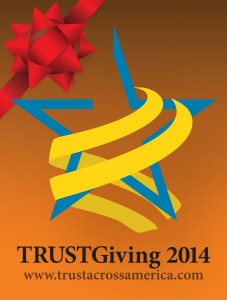Welcome to TRUSTGiving 2014, our first annual weeklong trust awareness campaign. Join the Alliance of Trustworthy Business Experts as our members help our readers navigate the complexities of trust. We will be blogging (several times a day) and posting on Twitter #TrustGiving2014.
Read what Randy Conley has to say about trust and betrayal.
How Can You Give Trust When You Have Been Betrayed?
Suffering a betrayal of trust can be one of the most difficult and challenging times in your life. Depending on the severity of the offense, some people choose not to pursue recovery of the relationship. For those that do, the process of restoration can take days, weeks, months, or even years. If you choose to invest the time and energy to rebuild a relationship with someone who has broken your trust, you have to begin with forgiveness.
As you consider forgiving someone who has betrayed your trust, here are some things to keep in mind:
- Forgiveness is a choice – It’s not a feeling or an attitude. Forgiving someone is a mental decision, a choice that you have complete control over. You don’t have to wait until you “feel” like forgiving someone.
- Forgiving doesn’t mean forgetting – You don’t have to forget the betrayal in order to forgive. You may never forget what happened, and those memories will creep in occasionally, but you can choose to forgive and move on.
- Forgiveness doesn’t eliminate consequences – Some people are reticent to give forgiveness because somehow they think it lets the other person off-the-hook from what they did wrong. Not true. Consequences should still be enforced even if you grant forgiveness.
- Forgiving doesn’t make you a weakling or a doormat – Forgiveness shows maturity and depth of character. If you allow repeated violations of your trust then you’re a doormat. But forgiving others while adhering to healthy boundaries is a sign of strength, not weakness.
- Don’t forgive just to avoid pain – It can be easy to quickly grant forgiveness in order to avoid conflict and pain in the relationship. This usually is an attempt at conflict avoidance rather than true forgiveness. Take the appropriate amount of time to think through the situation and what will be involved in repairing the relationship before you grant forgiveness.
- Don’t use forgiveness as a weapon – If you truly forgive someone, you won’t use their past behavior as a tool to harm them whenever you feel the need to get a little revenge.
- Forgiveness isn’t dependent on the other person showing remorse – Whether or not the person who violated your trust apologizes or shows remorse for their behavior, the decision to forgive rests solely with you. Withholding forgiveness doesn’t hurt the other person, it only hurts you, and it’s not going to change anything that happened in the past. Forgiveness is up to you.
- Forgiveness is freedom – Holding on to pain and bitterness drains your energy and negatively colors your outlook on life. Granting forgiveness allows you to let go of the negative emotions that hold you back and gives you the ability to move forward with freedom and optimism.
Forgiveness is the first step in rebuilding a relationship with someone who has betrayed your trust. As we head into the holiday season, TRUSTGiving2014 is an ideal time to take action to repair those low-trust relationships you’ve been tolerating. The choice is yours. Will you choose to forgive?
Randy Conley is the Vice President of Client Services & Trust Practice Leader for The Ken Blanchard Companies. He works with clients around the globe helping them design & deliver training and consulting solutions that build trust in the workplace and oversees Blanchard’s client delivery operations. He has been named a Top 100 Thought Leader in Trustworthy Business Behavior by Trust Across America. Randy holds a Masters Degree in Executive Leadership from the University of San Diego. You can follow Randy on Twitter @RandyConley where he shares thoughts on leadership and trust.
Barbara Brooks Kimmel is the Executive Director of Trust Across America-Trust Around the World whose mission is to help organizations build trust. She is also the editor of the award winning TRUST INC. book series and the Executive Editor of TRUST! Magazine. In 2012 Barbara was named “One of 25 Women Changing the World” by Good Business International.
Copyright 2014, Next Decade, Inc.


Recent Comments